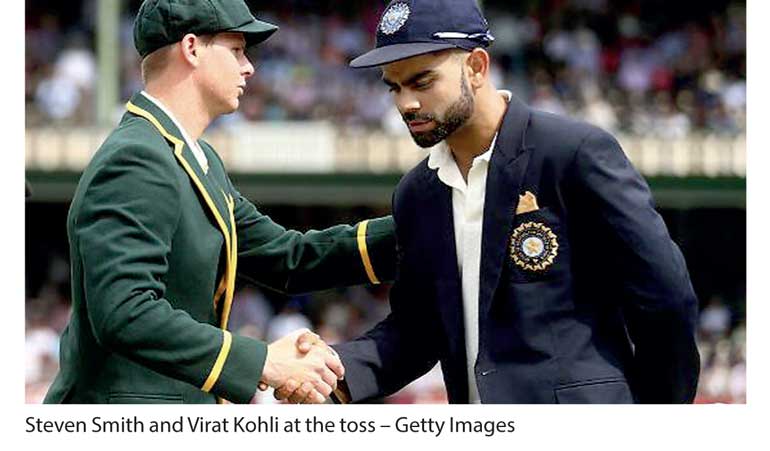Sunday Feb 22, 2026
Sunday Feb 22, 2026
Friday, 27 October 2017 00:00 - - {{hitsCtrl.values.hits}}
 ESPNcricinfo: Steven Smith believes his opposite number Virat Kohli invented claims of systemic DRS abuse by the touring team as a form of gamesmanship during a this year’s Border-Gavaskar Test series, in which Australia’s captain also described the BCCI’s decision to release select stump microphone audio of verbal exchanges as “pretty ordinary”.
ESPNcricinfo: Steven Smith believes his opposite number Virat Kohli invented claims of systemic DRS abuse by the touring team as a form of gamesmanship during a this year’s Border-Gavaskar Test series, in which Australia’s captain also described the BCCI’s decision to release select stump microphone audio of verbal exchanges as “pretty ordinary”.
In shedding light on the hot-tempered encounter between India and Australia earlier this year, where the unfancied visitors came exceptionally close to ending the hosts’ long unbeaten run on home territory, Smith revealed how he is to this day mystified by Kohli’s accusations, which were dropped and never again mentioned from the moment the series was decided. Speaking exclusively to ESPNcricinfo – the full interview will run next week – Smith called the claims “rubbish”.
Kohli’s accusations followed a moment amid the cauldron of Australia’s fourth-innings chase of a small target on a difficult pitch in the second Test in Bangalore, when victory would have granted Smith’s team an unassailable 2-0 lead in the series following their surprise win in the opener in Pune. When given out lbw to a shooter, Smith ran the decision past his batting partner Peter Handscomb, who instinctively motioned towards the team viewing area for advice – a move outlawed under DRS protocols. Smith, too, turned around, before being sent on his way by the umpire Nigel Llong.
“It wasn’t until afterwards that I realised what a talking point it had become, fuelled by Kohli’s post-match claims that we’d called on off-field assistance twice earlier in the match to help our on-field deliberations,” Smith wrote in his book, The Journey. “As far as I was concerned, we’d never tried to consult with the dressing room beforehand and although he said he’d brought those previous occasions to the notice of the umpires, I can say categorically that we were never spoken to by either those umpires or match referee Chris Broad about any such breaches in protocol.
“Virat has always been a player who’s thrived in the most intense of environments, and like me he loves a battle and I can only think it was his way of raising the temperature in the series in an attempt to get the best out of himself. The idea of getting messages from the sidelines for that purpose was not a tactic we as a team ever spoke about and ... I can’t work out what he was referring to in his remarks.
“There was never anything further on the matter from the ICC and Virat never detailed the incidents he was referring to. And during the brief interactions we had - including at the captain’s briefing for the IPL as that tournament followed the series - he was friendly and it was as if any ill-feeling he may have had over the incident had disappeared. It was and still is all a big mystery to me.”
Smith also remains annoyed by how the BCCI chose to highlight an exchange between Ravindra Jadeja and Matthew Wade during the decisive Dharamsala Test match, during a series in which there were many instances of heated discussion among opponents. Smith additionally pointed out that ICC regulations prohibit broadcasters from airing audio captured on stump microphones when the ball is dead.
“It was an example of the banter that took place on the field, but it gave a very one-sided view of what was happening,” Smith wrote. “There would have been plenty of examples that could have been released of Indian players engaging with me and my team, such as when they were constantly in the ears of Matt Renshaw when he resumed his first innings in Pune having had to retire ill because of diarrhoea. Ian Gould asked Matthew and Ravindra to cut it out in Dharamsala and that was where it ended. So to rake it up in the way that it was benefited no-one.
“What was overlooked in the minor controversy that followed was that, under ICC guidelines, the broadcaster shouldn’t have been broadcasting audio from the stump microphones, except for instances when the ball was in play, and it certainly wasn’t when Matthew and Ravindra were having their discussions. But whatever the rights and wrongs of the situation, it was a timely reminder to players of both sides that the old adage of what happens on the field, stays on the field, no longer applies.”
Looking more broadly at the on-field behaviour of the Australian side, Smith said he had no qualms about his team seeking a verbal edge over opponents when matches get tight. He also took issue with the perception that his team was “nice as pie” on the field when dominating a match and only went into verbal aggressor mode when things were not going their way.
“I know there is a view that has us as the ugly Aussies and that although, when we are on top, we are all nice as pie on the field, when the opposition gets success against us then we are quick to get into them verbally, but I don’t see it like that,” he wrote. “It’s simply that, as a group of players, we don’t like backing down in a contest and the greater the intensity of the action on the field the more we all back each other up.
“If that’s through the odd word with our opponents so be it. The umpires are there to step in if anything is out of order and I don’t think there was much, if anything, that fitted the bill through the series.”